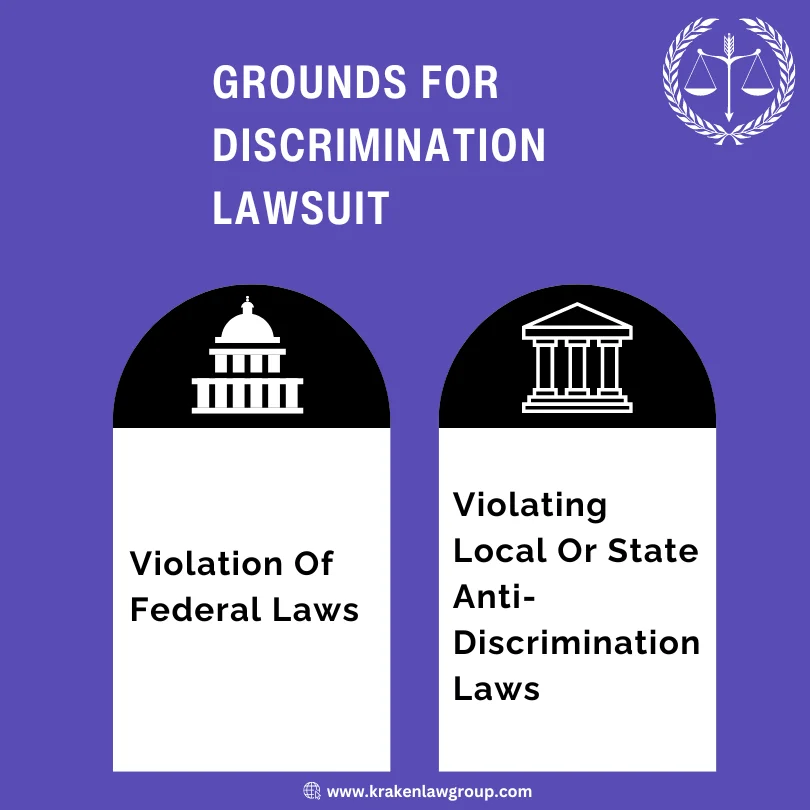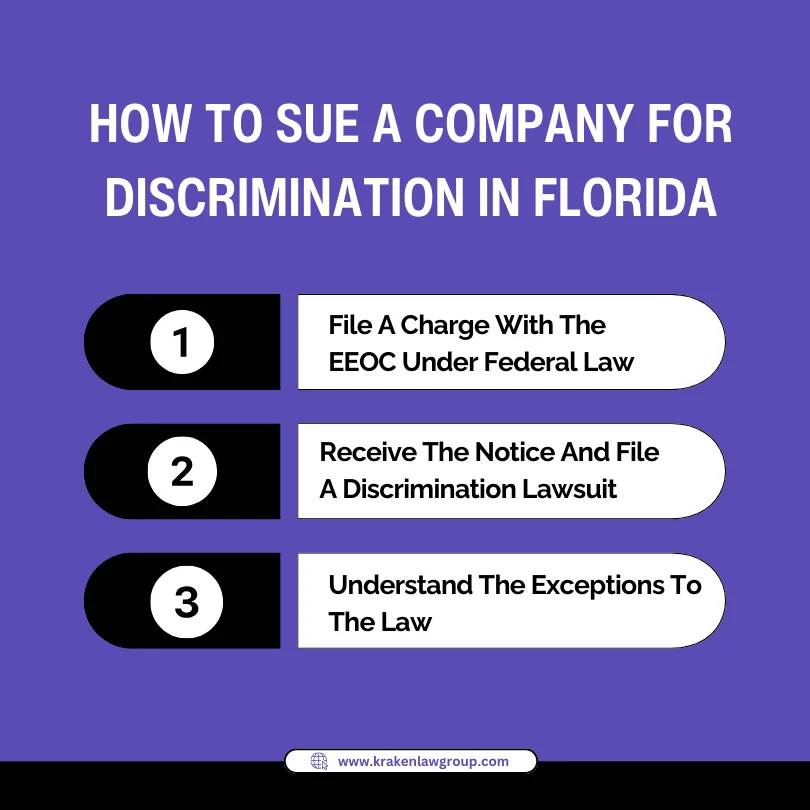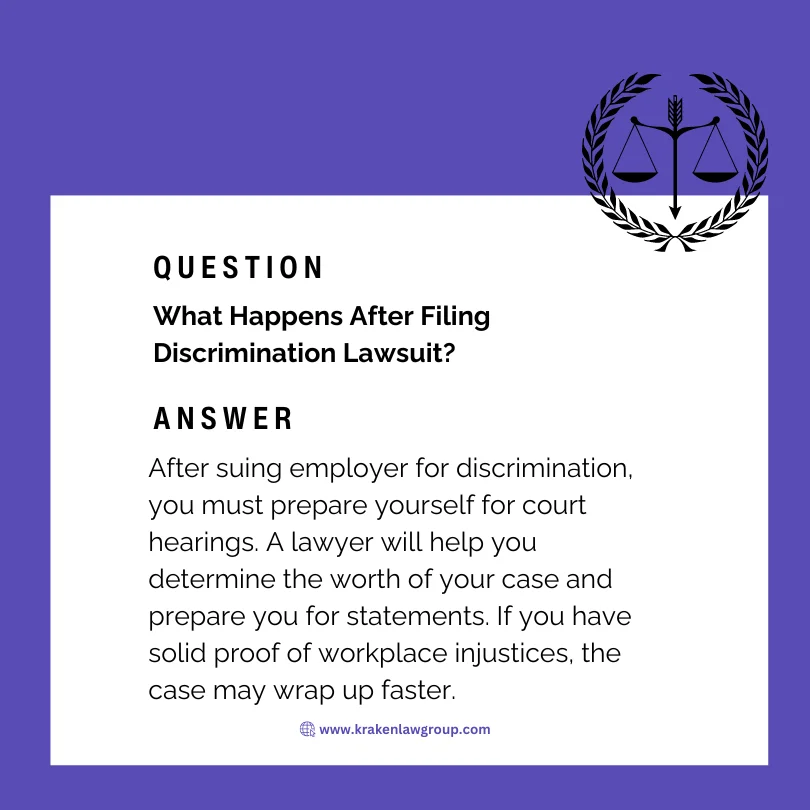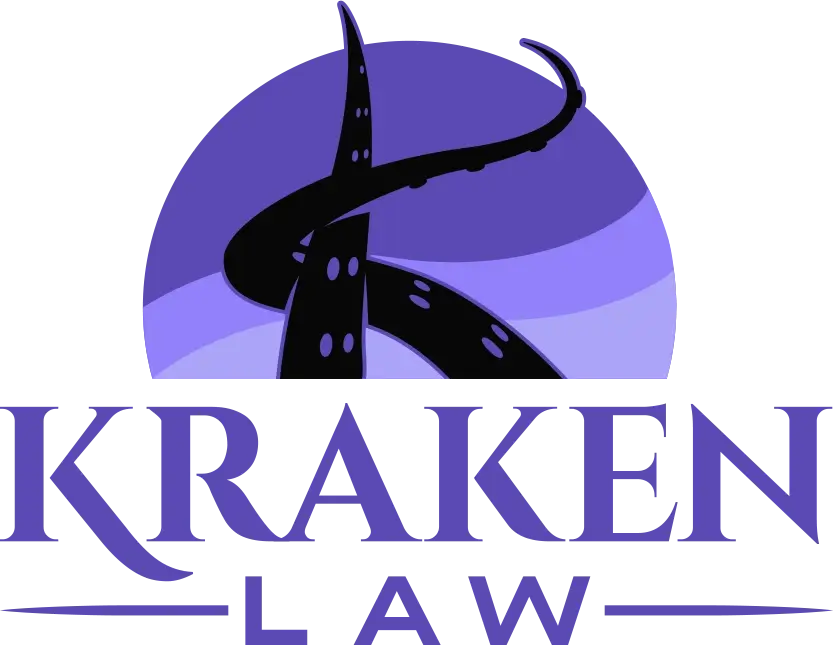Workplace discrimination can be dealt with in many ways. You may file an internal complaint to the HR department. They can investigate the case and take action against your harasser.
However, complaining to HR is not always satisfying. The most effective way to deal with injustices is by suing employer for discrimination.
A government agency will then help you get justice for your unfair treatment. So let’s look at everything you must know about suing employer for discrimination in Florida.
What Are The Grounds For Discrimination Lawsuit Against An Employer?

Workplace discrimination can be in many forms from minor rebukes to violent acts. However, every injustice at your company may not be illegal.
The federal and local government agencies have set specific grounds for discrimination lawsuit cases. Let’s look at them:
1. Violation Of Federal Laws
The EEOC implements different laws that protect workers from discrimination in offices. If your employer violates any one of the laws set by the government, they can be held liable.
These laws include the:
- Pregnancy Discrimination Act
- Age Discrimination Act (ADEA)
- Equal Pay Act
- Americans With Disabilities Act
Any company that refuses to offer you a promotion or wrongfully terminates you because of pregnancy can be held liable by the court.
Workplaces also must not discriminate against workers aged 40 and above. Otherwise, they would be violating the ADEA.
Other laws that come under the Civil Rights Act must also be upheld. If your workplace discriminates against you based on your race, appearance, nationality, and gender, you will meet grounds for suing employer for discrimination.
2. Violating Local Or State Anti-Discrimination Laws
Besides the EEOC, there are Fair Employment Practices Agencies (FEPAs) in different US states. These organizations are designed to protect workers from discrimination through local laws.
Remember if you file a discrimination lawsuit or charge with the FEPA, it will also be filed with the EEOC if federal laws are in violation too.
These agencies offer greater protection to employees by protecting them from discrimination due to:
- Marital status
- Children
- Family planning
- Sexual orientation
Your company may discriminate against you due to your unmarried status or spouse’s religion. Females who have kids face workplace injustices more often than males due to prejudices about performance.
A recruiter may also ask you family planning questions to determine whether they should offer you the job. Candidates that don’t plan to have kids may be preferred over those that do.
All these examples are grounds for discrimination lawsuit cases you can file with the FEPA of your state.
How To Sue A Company For Discrimination In Florida?

Below are the steps you must follow when suing employer for discrimination:
1. File A Charge With The EEOC Under Federal Law
Suing employer for discrimination is a must if your company’s policies fail to protect you. The top agency to file a charge with is the EEOC. This is especially true if the discriminatory act violates the federal law.
You will have to open the online public portal of the EEOC to start an inquiry against your employer. The agency may ask you to fill out a questionnaire to determine whether your complaint falls under their purview.
If it does, the agency will create an official account for you on their site. You can use that account to schedule an interview with an EEOC employee. The primary purpose of a meeting is to make you aware of your options.
Remember not to worry about word of discrimination charges reaching your boss yet. EEOC will keep all things confidential until you file an official charge, after which they must send a notification to your employer.
The EEOC staff member would also guide you on how you can fill out the forms to file a “Charge of Discrimination” with their agency.
All laws enforced by this agency require you to file a discrimination charge except for The Equal Pay Act.
2. Receive The Notice And File A Discrimination Lawsuit Within 90 Days
Once you file a discrimination charge within the given time limits by the EEOC, your boss will receive a notification. The agency will make them aware within 10 days that you’re filing a complaint against them.
You will also have to wait some days before filing a discrimination lawsuit. The EEOC will investigate the case properly once you file a charge with them.
Until the investigation is complete, you cannot start a lawsuit in court. This is why you must wait patiently until then or consult a workplace discrimination lawyer.
If the EEOC finds your company to be at fault, they may help with mediation between you and your employer. Its main purpose is to save the nation’s resources by keeping the case out of court.
However, if no agreement can be reached, the agency will be offering you a notice for suing employer for discrimination.
You will also receive such notice if the agency does not litigate your employer due to lack of evidence or other reasons.
Once you receive the suing notice, you must file a lawsuit within 90 days. If you don’t follow the timelines set by the EEOC, you will lose your right to pursue a case.
3. Understand The Exceptions To The Law When Suing Employer For Discrimination
Consulting or hiring a workplace discrimination lawyer will be necessary if you pursue the case in court. Your attorney will also help you understand exceptions to suing employer for discrimination.
For instance, an age discrimination lawsuit doesn’t require you to wait for the suing notice from the EEOC. You can pursue the case in court any time after 60 days of filing the discrimination charge.
The Equal Pay Act also doesn’t require you to file a discrimination charge or wait for investigation completion. You can go to court immediately if you ensure the discrimination event took place within two years.
Your workplace discrimination lawyer can help you understand other exceptions to federal laws. The best thing is they may also assist you in filing court lawsuits.
An attorney may also tell you when suing employer for discrimination is fruitful. For instance, your case of injustice may not help you receive significant compensation.
A lawyer is also necessary during the mediation process by the EEOC. Their skills can help you get the most out of your discrimination lawsuit. So be sure to consult an employment or workplace discrimination lawyer.
What Happens After Filing Discrimination Lawsuit?

After suing employer for discrimination, you must prepare yourself for court hearings. A lawyer will help you determine the worth of your case and prepare you for statements.
For example, they will help you determine which facts to disclose during the case and which to avoid. Your employer will also receive a notification about the case and time to hire an attorney.
Before the court hearing date arrives, you must collect evidence to prove the discrimination charge. If you have solid proof of workplace injustices, the case may wrap up faster.
What Is The Time Frame For Suing Employer For Discrimination?
If your employer is violating federal laws, you can file a lawsuit within 180 days of the discriminatory act. This limit mainly applies to filing charges with the EEOC.
The time frame will extend to 300 days if you file a claim with the Florida Commission on Human Rights (FCHR). This agency mainly handles complaints against small employers.
Is It Worth Suing Your Employer For Discrimination?
It is worth suing employer for discrimination to get justice against workplace injustices. Taking action against your perpetrators can help you reduce discrimination in your company.
The complaint may also help receive significant compensation especially if you have been wrongfully terminated. Consulting a lawyer will also help you determine whether suing employer for discrimination will be worth it.
FAQs
Can An Employee Sue An Employer In Florida?
An employee can sue their boss in Florida by filing a discrimination charge with the EEOC or FHCR. You may also file a case against your boss through FEPA if they’re violating state laws.
What Is The Law Against Discrimination In Florida?
Any employer can be held liable in Florida if they discriminate against their workers based on age, gender, pregnancy, disabilities, race, and more.
Can An Employee Sue A Manager Personally In Florida?
Workers must file a complaint with the relevant government agency designed to deal with discrimination. Once the agency offers a suing notice, employees can file a lawsuit against their perpetrators.
Where Do I Report Discrimination In Florida?
You can report discrimination in Florida with the EEOC for violation of federal laws. For state laws, the FHCR deals with discrimination complaints.
Contact An Attorney When Suing Employer For Discrimination
Now that you’re familiar with suing employer for discrimination, you must look for an expert attorney. A lawyer will fight your lawsuit in court or may help with the mediation process.
The good news is you don’t have to search further. Contact us today to connect with our team of workplace discrimination lawyers.


